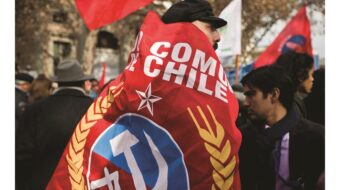Like a terrible figure from a recurring nightmare, former Chilean Gen. Juan Manuel Contreras has once again thrust himself into the limelight of U.S.-South America relations.
In a Dec. 3 statement on Chilean television, Contreras claimed the Sept. 21, 1976, car bomb assassination of Orlando Letelier, a foreign minister under socialist President Salvador Allende, was jointly decided upon by Chile’s military dictator, Gen. Augusto Pinochet, and U.S. Gen. Vernon Walters, the deputy director of the Central Intelligence Agency.
Ronni Moffitt, Letelier’s U.S. assistant, was also killed in the blast. Her husband Michael Moffitt was injured but survived. At the time, the head of the CIA was George H.W. Bush, later president and the father of the current U.S. chief executive.
Contreras said Pinochet and Walters also jointly plotted the murder of former Chilean army chief Gen. Carlos Prats and his wife, who were killed by a car bomb in Argentina in 1974.
Contreras headed the DINA, the Chilean secret political police, from the Sept. 11, 1973, coup that overthrew Allende until 1977. He later fell out with Pinochet, whom he believes abandoned him when the dictatorship ended and investigations into the crimes of that era began to mount.
On Contreras’ watch, many opponents of the Pinochet dictatorship were hunted down and killed. The DINA’s murder spree became a multinational operation called “Operation Condor” as the dictators of Argentina, Uruguay, Brazil, Paraguay, Bolivia and other Latin American countries joyfully pitched in to achieve the murder of their enemies, too.
Over time, Operation Condor developed links to violent right-wing Cuban exiles (including Luis Posada Carriles, said to have been at the meeting where the Letelier assassination was planned), Italian and Croatian neo-fascists, secret NATO operatives and, of course, the CIA.
Among those killed were the former president of Bolivia, Gen. Juan Jose Torres, and over 50,000 progressive Latin Americans, including guerrillas, students, social activists, trade union leaders, politicians and academics. Many were kidnapped and then tortured to death and buried in unmarked graves, or thrown into the sea from helicopters. Several Cuban diplomats were also assassinated.
Letelier and Moffitt were murdered in the middle of Washington’s Embassy Row. At the time, both were working at the Institute for Policy Studies (IPS), a progressive think tank.
If Gen. Walters was involved, it would mean that a deputy of the future President George H.W. Bush had planned a brutal murder of a U.S. citizen and a former foreign official on U.S. soil. It is difficult to imagine that Walters, who died in 2002, would have done that by himself.
But the matter is not so simple, because Contreras is hardly an unimpeachable source. He has served seven years of prison time and possibly faces additional consequences for DINA’s bloody actions.
Contacted by the World, a spokesperson for the IPS pointed out that Contreras made the same claims in 2005. Frequently his accounts clash with other sources and even with his own past statements. Contreras has shown a tendency to try to shift all blame from DINA, and thus from himself, onto Pinochet and the CIA, and thus lessen his own responsibility.
Yet even if Contreras’ latest bombshell can be discounted as self-serving, the connivance of U.S. authorities in Operation Condor is absolutely clear. And very serious questions remain about Washington’s involvement in a cover-up of the Letelier-Moffitt murders.
When DINA originally tried to send assassins to Washington, the U.S. ambassador in Chile found out about it and managed to get their visas blocked. But even though Washington officials knew an assassination plan was afoot, they did not warn Letelier, nor did they do much of anything to prevent future attempts, and the head of the assassination team, Michael Townley, was able to get into the U.S. with surprising ease.
In the early 1970s, relatively progressive governments ruled several Latin American countries. Henry Kissinger, then President Nixon’s national security adviser, and other top U.S. officials had sworn to put a stop to this, and showed no reluctance whatsoever to work closely with people with very bloody hands.
Today, there is a similar wave of political change bringing progressive democratic governments to power in Venezuela, Bolivia, Ecuador and elsewhere. Let’s make sure history does not repeat itself.












Comments